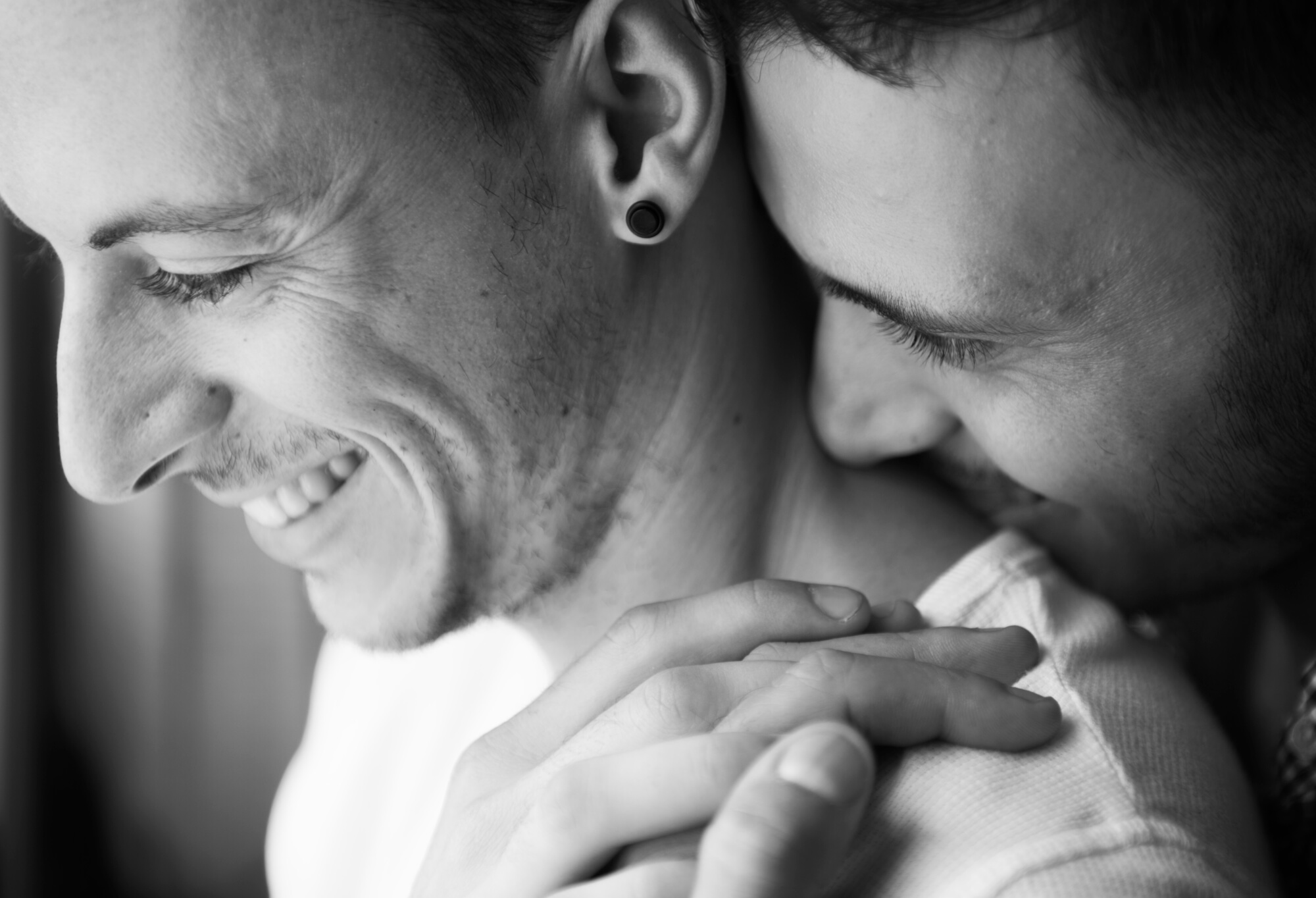

Christmas Hell: A Queer Journey Through Shame and Silence
The Christmas Morning I Couldn’t Show Up For Myself
It was a beautiful Christmas morning. The house was decorated, the tree was decorated. My children were excited and happy to be opening their gifts. There was lots of celebration and picture taking. Then it came my turn to open my gifts.
I couldn’t do it. I couldn’t bring myself to open the presents that were for me underneath that tree. A deep, overwhelming sense of shame gripped me. I felt unworthy. Despite having a loving family, a successful career as a high school principal, and a home many would envy, I was trapped—trapped in a prison of self-doubt, self-rejection, and self-loathing.
When Success Isn’t a Shield from Shame
Many people considered our family a model of the ideal family. And yet, there was a heavy cloud in my mind, a chain around my heart, and a sinking, aching feeling in my belly. This was the weight of internalized queer shame.
No matter what I achieved, how kind I was, or how hard I worked, I couldn’t shake the belief that I was unworthy of love, of happiness, of anything good.
The Difference Between Internalized Homophobia and Internalized Queer Shame
Just a few weeks before that Christmas, I had turned a corner on a wintry road, on my way to meet a stranger for a secretive sexual encounter. As my heart raced, I wrestled with the question:
“What am I doing? Why am I risking everything?”
And yet, I went through with it, as I had done many times before. Afterward, the familiar feeling of deadening shame returned—not just guilt, but a deep sense of unworthiness. It wasn’t just about what I did, it was about who I believed I was.
That Christmas morning, I could not open my gifts. I remember sitting there in our beautiful living room, with the beautiful tree, and simply not being able to do it. The weight of shame paralyzed me. I made some excuses: “I’ll do them after breakfast; everyone’s hungry.” But I wasn’t there. Not really. I was locked inside myself, drowning in shame.

The Weight of Internalized Queer Shame
In this blog, I want to explore how internalized queer shame robs us of our connection to ourselves, to others, and to life. It’s important to distinguish internalized queer shame from internalized homophobia.
Internalized homophobia is the fear of identifying as queer. This fear is natural and very appropriate in some places in the world, and even in some parts of our society here in Canada, where I live. Identifying as a queer person can still result in consequences in one’s career, social circles, and family rejection. There are still many hubs of deep, deep pathologizing of queer orientation, making it appropriate sometimes to have a reasonable fear of identifying as a queer person.
But internalized queer shame is different. It’s not just the fear of identifying; it’s the fear of being. This distinction is vital when it comes to healing internalized queer shame and understanding how it hijacks our joy, especially in moments that should feel celebratory, like the holidays. Whenever we are in the realm of the fear of being, we are in the realm of shame because shame rejects our very essence, our very being.
That Christmas morning, my shame manifested as a paralyzing inability to participate in the simplest of rituals – opening gifts with my family. I wasn’t just anxious or depressed; I felt hollow as if I had lost my connection to my own soul.
A Childhood Without Mirrors: Growing Up Without Representation
I was born into and raised in a Roman Catholic family, in a time and a culture—both within my family and my community – where being queer, being gay, being a lesbian, being bisexual, or being any of the terms that are more common today, was seen as the worst thing imaginable. I internalized the message that my very being was wrong and unworthy.
In a family of seven boys and two girls, and in a community devoid of positive queer representation, I learned to bury my same-sex attraction deep inside, behind layers of denial and shame. It wasn’t just that my attractions were sinful – I was taught that my existence was somehow ontologically evil.
In my family, in my church, in my community, in the absence of any queer stories in the books that I was given to read in schools, and in conversations that never happened, the absence of positive queer role models on television or in movies
I learned to deny, dismiss, intellectualize, and spiritualize same-sex attraction. I learned to create a persona, a facade of who I was, to put my attraction to men into a box that was separate and secret, locked in a prison of shame.
To survive, I learned to compartmentalize my attraction, creating a polished exterior while burying my truth.
This kind of upbringing, with no reflection of our reality, often leads queer individuals to seek queer mental health support in Canada as adults, when the weight of shame becomes unbearable.
The Polished Persona and the Hidden Pain
On that Christmas morning, the weight of carrying this secret had become too much to bear. I was tired of the constant sense of self-rejection, self-criticism, self-judgment, and self-shaming, so I simply couldn’t open my gifts.
And as Christmas day carried on and I carried on with the festivities and the parties and the gatherings with friends and family, rising to the occasion with my persona, being involved, doing the cooking or cleaning or whatever it was needed to be done, engaging with my children, still, my presents sat under the tree. And every time I looked at them, I wanted to weep. For me, it was a Christmas season spent in hell.
I was living a curated, successful life on the outside, but inside, I was suffocating.
Living in a Hell of Isolation
Hell isn’t fire and brimstone. Hell is the isolation we feel when we are disconnected from ourselves, from others, and from the world. That Christmas, I was living in hell. Whenever my wife or children asked why I hadn’t opened my gifts, I’d deflect: “I’ll get to them later.” I made jokes, threw up defenses, and tried to focus on the “true meaning” of Christmas—family, friends, togetherness. But inside, I was numb.
I had come to that place in my life where I didn’t believe that I was worthy of those gifts under the tree. It didn’t matter how successful I was or what I had accomplished.
It didn’t matter how talented I was.
It didn’t matter how many students or staff or families I had helped, how many friends turned to me in times of crisis or need in their lives.
None of it mattered; neither did I.
None of it could make up for this deep sense of being unworthy, unacceptable.
For many queer folks, the holiday season amplifies this sense of disconnect. That’s why coping with shame during the holidays is a vital part of mental health conversations in our community.
Christmas with the Gifts I Couldn’t Accept
As we moved past New Year’s and the time came to take down the tree, my wife gently confronted me. She told me that my refusal to open my gifts was affecting everyone—her, our children. I knew she was right, but I had no words to explain the depth of my shame. There was no logic to it.
Internalized queer shame isn’t rational—it’s a full-body experience. It consumes the mind, heart, and soul. It’s like disappearing.
And when my wife at the time bravely confronted me with the impact that this was having on my family, that I wasn’t able to open my gifts, I felt frozen. I knew in my head that this was irrational, but that didn’t make one bit of difference to how I felt.When I finally forced myself to open the gifts, it felt like a hollow act. I said, “thank you,” but the words rang empty.
As I share this story now, I feel a deep sadness for the way shame robbed me of my ability to experience joy, connection, and self-worth. And a sadness for how it robbed those who genuinely cared for me, valued me and wanted to celebrate me of the joy of experiencing their love received.
Even surrounded by love, the internal narrative of unworthiness persisted, reminding us why therapy for LGBTQ+ self-worth is about more than just managing symptoms. It’s about learning to receive love as we are.
A Journey Toward Healing
Looking back on that Christmas, I understand now that my shame wasn’t about those gifts or that day – it was about a lifetime of feeling unworthy. I see now how internalized queer shame had woven itself into every part of my life, making it impossible for me to believe that I deserved love, happiness, or peace.
Part of my healing journey has involved overcoming internalized homophobia and shame, recognizing it not as my truth, but as a distortion I was taught to carry.
This journey of healing is ongoing, but I want you to know – if you’ve felt this way, you are not alone. Internalized queer shame isolates us, but it can be healed. It’s not about rejecting who you are; it’s about reclaiming the worth and value that has always been yours.
The gifts we deserve – love, connection, belonging – are there for us. And we are worthy of them.
Join me and countless others as we continue to build resilience to internalized queer shame. In future Bolgs I will dive more deeply into how Internalized queer shame drives our feelings, thinking and behaviours to sabotage our authenticity and satisfaction with our lives.
If you’ve ever felt trapped in your own curated life, unable to receive love, you’re not alone. Internalized queer shame is powerful, but it is not permanent Reach out. You deserve to reclaim the joy and connection that are already yours. Book a free 20-minute consultation and let’s begin your healing journey together.



https://shorturl.fm/SvUFH
https://shorturl.fm/6QtsT
https://shorturl.fm/Gtuxa
https://shorturl.fm/v2EDw
https://shorturl.fm/sSTQB